2021年高二下学期期末综合练习 英语 含答案
2021年高二下学期期末考试英语试题含解析
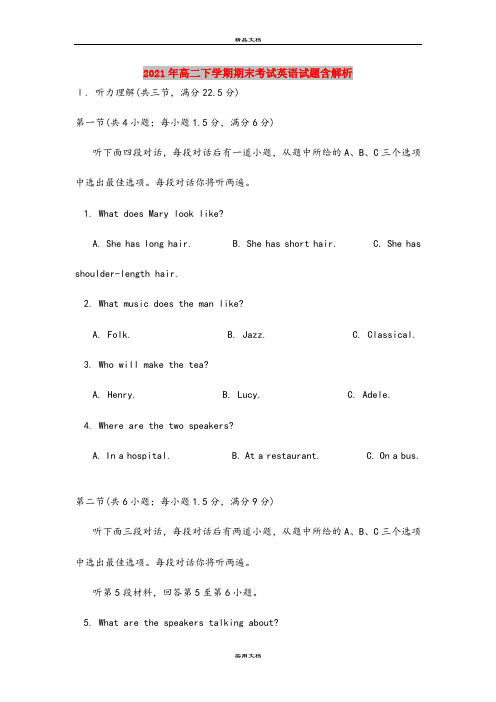
2021年高二下学期期末考试英语试题含解析Ⅰ. 听力理解(共三节,满分22.5分)第一节(共4小题;每小题1.5分,满分6分)听下面四段对话,每段对话后有一道小题,从题中所给的A、B、C三个选项中选出最佳选项。
每段对话你将听两遍。
1. What does Mary look like?A. She has long hair.B. She has short hair.C. She has shoulder-length hair.2. What music does the man like?A. Folk.B. Jazz.C. Classical.3. Who will make the tea?A. Henry.B. Lucy.C. Adele.4. Where are the two speakers?A. In a hospital.B. At a restaurant.C. On a bus.第二节(共6小题;每小题1.5分,满分9分)听下面三段对话,每段对话后有两道小题,从题中所给的A、B、C三个选项中选出最佳选项。
每段对话你将听两遍。
听第5段材料,回答第5至第6小题。
5. What are the speakers talking about?A. Watching a movie.B. Making a poster.C. Writing a story.6. When will they meet?A. 4:15.B. 4:25.C. 4:30.听第6段材料,回答第7至第8小题。
7. How does the woman feel?A. fortable.B. Energetic.C. Unsatisfied.8. What might be the relationship between the speakers?A. Manager and customer.B. Teacher and student.C. Doctor and patient.听第7段材料,回答第9至第10小题。
2021年高二下学期期末联考英语试题含答案
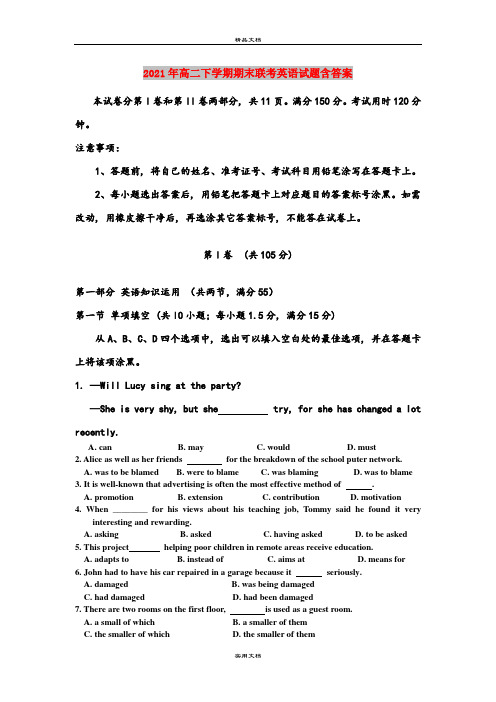
2021年高二下学期期末联考英语试题含答案本试卷分第I卷和第II卷两部分, 共11页。
满分150分。
考试用时120分钟。
注意事项:1、答题前, 将自己的姓名、准考证号、考试科目用铅笔涂写在答题卡上。
2、每小题选出答案后, 用铅笔把答题卡上对应题目的答案标号涂黑。
如需改动, 用橡皮擦干净后, 再选涂其它答案标号, 不能答在试卷上。
第I卷 (共105分)第一部分英语知识运用(共两节,满分55)第一节单项填空 (共l0小题;每小题1.5分, 满分15分)从A、B、C、D四个选项中, 选出可以填入空白处的最佳选项, 并在答题卡上将该项涂黑。
1. —Will Lucy sing at the party?—She is very shy, but she try, for she has changed a lotrecently.A. canB. mayC. wouldD. must2. Alice as well as her friends for the breakdown of the school puter network.A. was to be blamedB. were to blameC. was blamingD. was to blame3. It is well-known that advertising is often the most effective method of .A. promotionB. extensionC. contributionD. motivation4. When ________ for his views about his teaching job, Tommy said he found it veryinteresting and rewarding.A. askingB. askedC. having askedD. to be asked5. This project helping poor children in remote areas receive education.A. adapts toB. instead ofC. aims atD. means for6. John had to have his car repaired in a garage because it seriously.A. damagedB. was being damagedC. had damagedD. had been damaged7. There are two rooms on the first floor, is used as a guest room.A. a small of whichB. a smaller of themC. the smaller of whichD. the smaller of them8. Her mother and father found all this rather hard but eventually accepted her choices, ______ she was happy.A. as long asB. even ifC. if onlyD. as far as9. wants to stay in a hotel has to pay their own way.A. AnyoneB. The oneC. WhoeverD. Who10. —This apple pie is too sweet, don’t you think so?—_____. I think it’s just right, actually.A. I hope soB. Not reallyC. Sounds good D .No wonder第二节完形填空(共30小题;A篇每小题1分, B篇每小题1.5分, 满分40分) 阅读下列短文, 从短文后各题所给的四个选项(A、B、C和D)中选出最佳选项, 并在答题卡上将该项涂黑。
2021-2022年高二下学期期末考试英语试题 含答案(V)
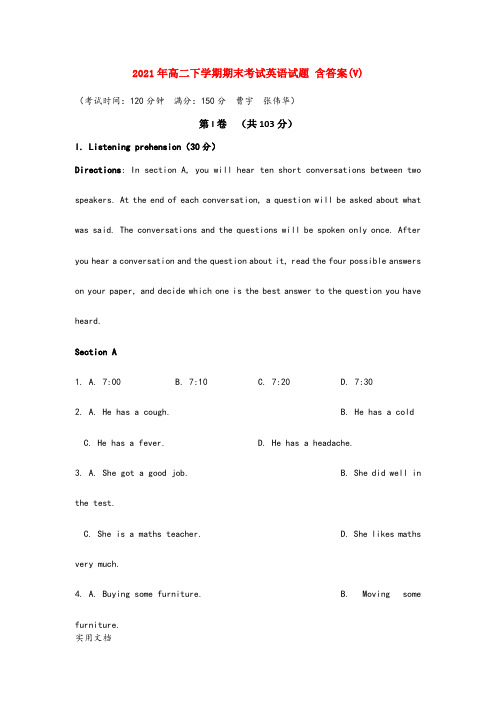
2021年高二下学期期末考试英语试题含答案(V)(考试时间:120分钟满分:150分曹宇张伟华)第I卷(共103分)I. Listening prehension(30分)Directions: In section A, you will hear ten short conversations between two speakers. At the end of each conversation, a question will be asked about what was said. The conversations and the questions will be spoken only once. After you hear a conversation and the question about it, read the four possible answers on your paper, and decide which one is the best answer to the question you have heard.Section A1. A. 7:00 B. 7:10 C. 7:20 D. 7:302. A. He has a cough. B. He has a coldC. He has a fever.D. He has a headache.3. A. She got a good job. B. She did well in the test.C. She is a maths teacher.D. She likes maths very much.4. A. Buying some furniture. B. Moving some furniture.C. Looking for a bigger room.D. Buying a new house.5. A. At school B. In a hospital C. In an office D. On the phone6. A. Go on working B. Quit her job C. Go to the seaside D. Go home7. A. Friends B. Sister and brotherC. Policeman and driverD. Classmates8. A. He wants to play basketball. B. He doesn’t want to do anything.C. He’d like the woman to decide.D. He is quite busy right now.9. A. Get up early. B. Read English after getting up.C. Do exercise in the morning.D. Have a walk for ten minutes.10. A. The place B. The party C. The people D. The noise Section BQuestion 11 through 13 are based on the following passage.11. A. At least 1,300 years.B. More than 3,000 years.C. Less than 2,300 years.D. More than 1,000 years.12. A. Singapore B. India C. Korea D. Malaysia13. A. Gold B. Wood C. Silver D. Bamboo Question 14 through 16 are based on the following passage.14. A. At the top of a mountain of Yunnan Province.B. Along Chirui LakeC. In Shiping County.D. Between the Ming Village and the Qing Village15. A. 10 B. 28 C. 403 D. 60016. A. Living buildings. B. Mountains and water.C. Qing and Ming museums.D. Ancient halls and towers.Section CBlanks 17 through 20 are based on the following conversation.plete the form. Write ONE WORD for each answer.Blanks 21 through 24 are based on the following conversation.plete the form. Write NO MORE THAN THREE WORDS for each answer.II. Grammar (16分)Directions: After reading the passages below, fill in the blanks to make the passages coherent and grammatically correct. For the blanks with a given word, fill in each blank with the proper form of the given word; for the other blanks, use one word that best fits each blank.(A)Several years ago, I drove into a service station to get some gas. It wasa beautiful day, I was feeling great. As I walked into the station to pay for the gas, the attendant said to me: “You don’t look well” That pletely took me by surprise, I told him I had never felt 25 (well). Without hesitation he told me I looked terribly bad and my skin appeared yellow.When I left the service station, 26 (feel) a little uneasy, I pulled over to the side of road and look at my face in the mirror. How did I feel? Was everything all right? Had I picked up 27 rare disease? Had I picked up hepatitis(肝炎)?The next time I drove into the service station, I figured out what 28 (happen). The place had recently been painted a bright yellow, the light 29 (reflect) off the walls made someone inside look as though they had hepatitis.I wondered how many folks had reacted the way I did. I had let one short conversation with a total stranger 30 (change) my attitude for an entire day. He told me I looked sick, and before long, I was actually feeling sick. That single negative observation had a profound effect 31 the way I felt and acted.A little while later I saw how funny the incident was. I wonder how many other people that the man had told were ill 32 he realized that the service station had a paint job.(B)My daughter and I were flying to spend a week with my husband in Florida. The plane was totally full. I had noticed some Boy Scouts (童子军) at the gate and promised to my daughter that if 33 happened, we would be OK with all those Scouts on our flight!Unfortunately, our seats were separated by the aisle(走道). Kallie was nervous about the trip and had counted on my reading to her the whole way. 34 (try) to read across the aisle would be a challenge.When the two passengers who shared my row boarded the plane, I asked if they __35__ switch places with Kallie and me. They refused. Meanwhile, a mother and her three children were panicking several rows ahead of us. There had been a mistake with their boarding passes, and the whole family 36 (split) up. The passengers in her row also refused to move. The mother was concerned about the younger boy sitting with strangers.Suddenly the Scout leader stood up and said, “Ma’am, we can help you.” He then spent five minutes rearranging his group. The mother’s relief was obvious.Kallie, however, was still upset. I told her that there wasn’t anything 37 I could do; we would have to sit 38 we were. Gradually, the man sitting next to the Scoutmaster (not a Scout himself) turned around and as ked, “Would you and your daughter like our seats?” We traded seats and continued our trip, very much 39 (relieve) to be together.Would that man have offered us his seat if the Scouts hadn’t done so for the mom and her children? I don’t know. But the belief lives on in my mind 40kindness is contagious (蔓延)!III. Vocabulary (10分)Directions: plete the following passage by using the words in the box. Each word can only be used once. Note that there is one word more than you need.The documentary film The Alps tells the story of a young American mountaineer who 41 the North Face of the Eiger, considered Europ e’s most dangerous climb and one that 42 his father ’s life.The 40-minute film by Stephen Judson was shown in the IMAX Dome Theater of the Shanghai Science and Technology Museum on October 3, xx.When John Harlin III was only nine years old, his father John Harlin II died while 43 the North Face of the Eiger in Switzerland in 1996, Thirty-nine years later, in xx, Harlin confronted his demons and attempted the same climb. “For a long time I grew up in the 44 of my father ’s tragedy. But after many years ’ fear I finally climbed the mountain, where I found a closer 45 with my father,” Harlin said at the premiere of the film in Shanghai.The film ’s 46 was supported by the Switzerland Tourism Agency andfeatures magnificent scenery.During the world Expo, the Switzerland Pavilion screened a seven-minute condensed version of the film. The pavilion 47 an indoor cable ride through Switzerland, a photo exhibition and a tourism-themed night.The film also explains the 48 and geology of the Alps and why the North Face of the Eiger is so dangerous.Harlin says the film not only documents the greatest moment in his life, but also 49 the importance of family, love and respect for nature.His father 50 these values on young Harlin and he, in turn, has passed them on to his young daughter.IV.Reading prehension(47分)Section A (15分)Directions: For each blank in the following passage there are four words or phrases marked A, B, C and D. Fill in each blank with the word or phrase that best fits the context.In a city of south India lived a young man who was always dreaming of being rich. He often heard about some traders in his city who gathered a great deal of 51 in the course of their travels across the world. He believed he couldalso make a great achievem ent although he didn’t have any 52 in business at all. So, one fine day, the young man set out on a long 53 in search of trade opportunities.54 though, he did not bee as rich as he had thought he would. Worse, he spent more money on his travels than he 55 in the course of his trade. All this made him feel confused and 56 , but he refused to return home without 57 .One day, while he was wandering on the shore in a seaside town, his eyes 58 on an object which he thought should be a large ship at a distance.“When I bee rich, I shall buy a ship just like that one and 59 around the world,” he said ambitiously. Then he waited to see the ship enter the harbor. As the ship got closer, it lost its 60 dimensions(规模) and looked more like a small boat. When the boat reached the 61 , the young man let out a big heavy sigh because he discovered that it was only a bunch of logs tied together. He was terribly 62 to see such a raft(木筏).Finally he understood. Just as he 63 a lot of time on fruitless speculation(猜想) about the “ship”, his expectations of getting 64 was also without any real basis. Therefore, he decided to return home and 65 upa more practical job.51. A. energy B. knowledge C. resource D. fortune52. A. expectation B. experience C. interest D. ambition53. A. journey B. partnership C. vacation D. period54. A. Unreasonably B. Unbelievably C. Unconsciously D. Unfortunately55. A. begged B. borrowed C. earned D. adopted56. A. uncertain B. excited C. patient D. indifferent57. A. hesitation B. success C. problem D. ine58. A. depended B. focused C. insisted D. lived59. A. show B. turn C. sail D. fly60. A. correct B. formal C. real D. grand61. A. bank B. shore C. ocean D. bottom62. A. disappointed B. pleased C. puzzled D. astonished63. A. saved B. valued C. wasted D. created64. A. rich B. learned C. smart D. strong65. A. set B. gave C. made D. tookSection B (24分)Directions: Read the following three passages. Each passage is followed by several questions or unfinished statements. For each of them there are four choices marked A, B, C and D. Choose the one that fits best according to the information given in the passage you have just read.(A)Some years ago, writing in my diary used to be a usual activity. I would return from school and spend the expected half hour recording the day’s events, feelings, and impressions in my little blue diary. I did not really need to express my emotions by way of words, but I gained a certain satisfaction from seeing my experiences forever recorded on paper. After all, isn’t accumulating memories a way of preserving the past?When I was thirteen years old, I went on a long journey on foot in a great valley, well-equipped with pens, a diary, and a camera. During the trip, I was busy recording every incident, name and place I came across. I felt proud to be spending my time productively, dutifully preserving for future generations a detailed description of my travels. On my last night there, I wandered out of my tent, diary in hand. The sky was clear and lit by the glare of the moon, and the walls of the valley looked threatening behind their screen of shadows.I automatically took out my pen…At that point, I understood that nothing I wrote could ever match or replace the few seconds I allowed myself to experience the dramatic beauty of the valley.All I remembered of the previous few days were the dull characterizations I had set down in my diary.Now, I only write in my diary when I need to write down a special thought or feeling. I still love to record ideas and quotations that strike me in books, or observations that are particularly meaningful. I take pictures, but not very often—only of objects I find really beautiful. I’m no longer blindly satisfied with having something to remember when I grow old. I realize that life will simply pass me by if I stay behind the camera, busy preserving the present so as to live it in the future.I don’t want to wake up one day and have nothing but a pile of pictures and notes. Maybe I won’t have as many exact representations of people and places; maybe I’ll forget certa in facts, but at least the experiences will always remain inside me. I don’t live to make memories—I just live, and the memories form themselves.66. Before the age of thirteen, the author regarded keeping a diary as a way of ______.A. observing her school routineB. expressing her satisfactionC. impressing her classmatesD. preserving her history67. What caused a change in the author’s understanding of keeping a diary?A. A dull night on the journey.B. The beauty of the great valley.C. A striking quotation from a book.D. Her concerns for future generations.68. What does the author put in her diary now?A. Notes and beautiful pictures.B. Special thoughts and feelings.C. Detailed accounts of daily activities.D. Descriptions of unforgettable events.69. The author es to realize that to live a meaningful life is ______.A. to experience itB. to live the present in the futureC. to make memoriesD. to give accurate representations of it(B)Do you realize that every time you take a step, the bones in your hip are subjected to forces between four and five times your body weight? When you are running, this force is increased further still. What happens if through disease a hip-joint ceases to be able to resist such forces? For many years hip-joints and other body joints have been replaceable either partially or pletely. It is after all a simple ball and socket joint; it has certain loads imposed on it; it needs reliability over a defined life; it must contain materials suitable for the working environment. Any engineer will recognize these as characteristic of a typical engineering problem, which doctors and engineers have worked together to solve, in order to bring a fresh lease of life to people who would otherwise be disabled.This typifies the way in which engineers work to help people and create abetter quality of life. The fact that this country has the most efficient agricultural industry in the world is another good example. Mechanical engineers have worked with farmers and biologists to produce fertilizers, machinery and harvesting systems. This team effort has now produced crops uniformly waist high or less so that they are better suited to mechanical harvesting. Similar advances with other crops have released people from hard and boring jobs for more creative work, whilst machines harvest crops more efficiently with less waste. Providing more food for the rapidly increasing population is yet another role for the mechanical engineer.70. According to the passage, when would most weight be imposed on hip-joints?A. When one is walking.B. When one is running.C. When one is standing.D. When one is lying down.71. Engineers regard the replacement of hip-joints as a(n) ____ Problem.A. mechanicalB. medicalC. healthD. agricultural72. According to the passage, how do engineers contribute to increasingefficiency of the agricultural industry?A. By working with farmers.B. By working in teams.C. By growing crops of the same height.D. By making agriculturalmachinery.73. According to the context, "This team effort'" in Paragraph Two refersto__________.A. mechanical engineers.B. doctors and engineers.C. biologists, doctors and farmers.D. farmers, biologists and engineers(C)Rules for the University Entrance Examination•You must be at the examination center ten minutes before the examination starts. If you are more than ten minutes late, you may not enter the examination center. The examination takes place at the same time in different states.•You must have proof of your name and grade as well as official examination number. Show these when you e to the examination center.•Depending on which examination you are taking, you may bring certain items into the examination center. Mathematics examinations may allow you to use electronic calculators. Other subjects may allow you to use dictionaries and other reference material. Please read the notes sent with your timetable carefully.•You must bring your own pencils. None will be provided for you. The following items are not allowed in the examination center: walkmans and radios, head sets, any food or drink, school bags, electronic equipment (unless specifically permitted for various subjects), and mobile phones.•Once in the center, you must sit at the desk with your examination number on it. When you sit down, place your examination number at the top corner of your desk.•You must remain silent during the examination. You must not disturb other people who are taking the test.•If you need a drink or toilet break, you should raise your hand and wait for the supervisor (监督者) to speak to you. You will be given water or the supervisor will take you to the bathroom. You are not allowed to talk with anyone during the break.•You must write your answers in the official answer sheet. Your supervisor will provide extra paper if you wish to make notes.•You may leave the examination room at any time if you do not plan to return. If you finish early and want to leave, please move well away from the examination center.•The supervisor will warn you fifteen minutes, five minutes and one minutebefore the end of the examination. When the supervisor says that the time is up, you must put down your pencil and wait at your desk until your paper is collected.74. What kind of examination are these rules probably for?A. A local exam.B. A final exam.C. A college exam.D. A national exam.75. What are you allowed to have with you when you take mathematics examination?A. Related material.B. Proof of yourself.C. A cell phone.D. A dictionary.76. What should you do if you finish the test early, and want to get a betterresult?A. Take some notes carefully.B. Leave the room immediately.C. Remain in your seat and check again.D. Raise your hand to inform your teacher.77. W hat can he provided for you during the exam?A. Pencils.B. Food and drinkC. Extra paper.D. Calculators.Section C (8分)Directions: Read the passage carefully. Then answer the questions or plete the statements in the fewest possible words.A sense of smell is very important to a person. Our nose helps us to know more about the world.The sense of smell starts with the nose, but it includes other parts of the head and the brain. Let us use the example of the burning match to understand how this sense works.When the match starts to burn, tiny little pieces of ash that e from the match float through the air. These small pieces of material are too small for us to see, but the nose is sensitive to them and can smell them as they travel through the air into our nose. When the small pieces of ash reach the olfactory nerve (嗅觉神经), which is like an electrical wire on a telephone, the olfactory nerve carries the message to the brain, telling it that we are smelling a burning match. We don’t always smell a smell right away, because it takes time for the small pieces to travel in the air and then into our nose to the olfactory nerve.Human beings have a very weak sense of smell. As people evolved and began to use reason more, they didn’t need to smell things quite as well as other animals did. They could use their eyes and their brains in a different way. Thereis one way our sense of smell is different from other senses. After sensing a particular smell for a long time, our sense of smell gets tired. When we first e into the house, we can smell dinner cooking, but after that, our olfactory nerves get tired and then we don’t smell anything at all. When we have a cold, our nose is all stuffed up, and we cannot smell certain things, like perfume or food.(Note: Answer the questions or plete the statements in NO MORE THAN TEN WORDS.)78. The sense of smell is not only related to the nose, but also has a connection with__________________________________________________________________________.79. How dose the olfactory nerve make people know a smell?__________________________________________________________________________.80. Why do people have a weaker sense of smell in contrast to other animals according to the passage?_________________________________________________________________________. 81. A healthy cook cannot smell the cooking most probably because__________________ .第II 卷(共47 分)I. Translation (4+4+4+5+5)Directions: Translate the following sentences into English, using the words given in the brackets.1. 和他争论艺术的起源没有任何意义。
2021年高二下学期期末考试英语试题 含解析
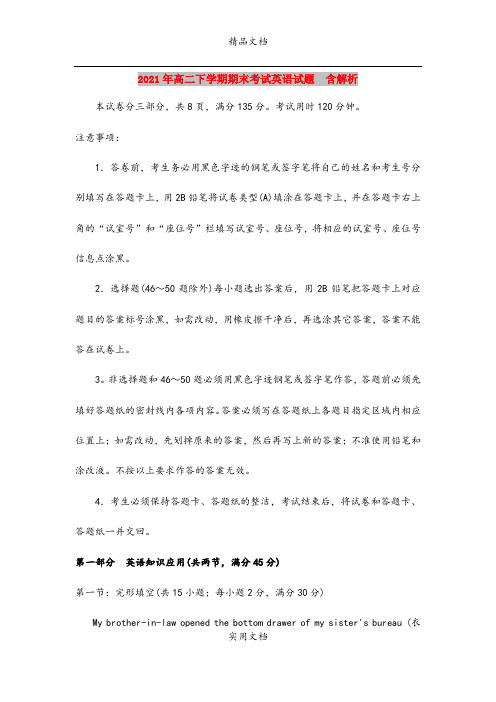
2021年高二下学期期末考试英语试题含解析本试卷分三部分,共8页,满分135分。
考试用时120分钟。
注意事项:1.答卷前,考生务必用黑色字迹的钢笔或签字笔将自己的姓名和考生号分别填写在答题卡上,用2B铅笔将试卷类型(A)填涂在答题卡上,并在答题卡右上角的“试室号”和“座位号”栏填写试室号、座位号,将相应的试室号、座位号信息点涂黑。
2.选择题(46~50题除外)每小题选出答案后,用2B铅笔把答题卡上对应题目的答案标号涂黑,如需改动,用橡皮擦干净后,再选涂其它答案,答案不能答在试卷上。
3。
非选择题和46~50题必须用黑色字迹钢笔或签字笔作答,答题前必须先填好答题纸的密封线内各项内容。
答案必须写在答题纸上各题目指定区域内相应位置上;如需改动,先划掉原来的答案,然后再写上新的答案;不准使用铅笔和涂改液。
不按以上要求作答的答案无效。
4.考生必须保持答题卡、答题纸的整洁,考试结束后,将试卷和答题卡、答题纸一并交回。
第一部分英语知识应用(共两节,满分45分)第一节:完形填空(共15小题;每小题2分,满分30分)My brother-in-law opened the bottom drawer of my sister's bureau (衣柜) and lifted out a wrapped package. In it was a really beautiful silk 1 . The price tag with an astronomical figure (天文数字) on it was still attached."Jane 2 this the first time we went to New York, at least 8 or 9 years ago. She seldom wore it. She was saving it for a(n) 3 occasion," my brother-in-law said.Together with the other 4 he gave that dress to the mortician(殡葬业者). Then he said to me, "Don't ever save anything for a special 5 . Every day you're 6 is a special occasion."I remembered those words through the funeral for my sister's unexpected 7 and the days that followed. Now I am spending 8 time with my family and friends; I'm not "saving" anything. "Someday" and "one of these days" are 9 from my vocabulary. If it's worth seeing or hearing or doing, I want to see and hear and do it now.It's those little things left 10 that would make me angry if I knew that my hours were limited. Angry because I 11 seeing good friends whom ! was going to get in touch with someday. Angry because I hadn't written certain letters that I intended to write one of these days.12 and sorry that I didn't tell my husband and daughter often enough how much I 13 love them.I'm trying very hard not to put off, hold back, or 14 anything that would add laughter and brightness to our 15 . And every morning when I open my eyes, I tell myself that every day, every minute, every breath truly, is a gift from God.【文章大意】本文通过叙述姐姐留着漂亮的连衣裙想要特殊场合再穿,意外死亡之前没穿几次的故事来告诉我们一个道理:每天都是一个特殊的场合,每天我们都要把自己想要做的事情做了,不要留到将来某一天,某些日子再做。
2021-2022年高二下学期期末考试英语含答案

2021年高二下学期期末考试英语含答案第一部分:听力(共两节,满分30分)第一节(共5小题;每小题1.5分,满分7.5分)听下面5段对话。
每段对话后有一个小题,从题中所给的A、B、C三个选项中选出最佳选项,并标在试卷的相应位置。
听完每段对话后,你都有10秒钟的时间来回答有关小题和阅读下一小题。
每段对话仅读一遍。
1.How does the man e here?A. By bus.B. By taxi.C. By car.2.Why isn’t He len present?A. She forgot to e.B. She changed her decision.C. She wasn’t invited.3.What’s the probable relationship between the two speakers?A. Husband and wife.B. Mother and son.C. Doctor and patient.4.What’s the man’s job?A. A shop assistant.B. A tailor.C. A salesman.5.What does the man mean?A. He can’t go to the cinema.B. He can go to the cinema on Saturday morning.C. He can go to the cinema on Saturday evening.第二节(共15小题;每小题1.5分,满分22.5分)听下面5段对话或独白。
每段对话或独白后有几个小题,从题中所给的A、B、C三个选项中选出最佳选项,并标在试卷的相应位置。
听每段对话或独白前,你将有5秒钟的时间阅读各个小题;听完后,各小题将给出5秒钟的作答时间。
每段对话或独白读两遍。
请听第6段材料,回答第6、7题。
6.When will the man go on holiday?A. In spring.B. In summer.C. In winter.7.Where is the man going?A. Switzerland.B. Italy.C. Austria.请听第7段材料,回答第8至10题。
2021年高二下学期期末联考英语试题 含答案
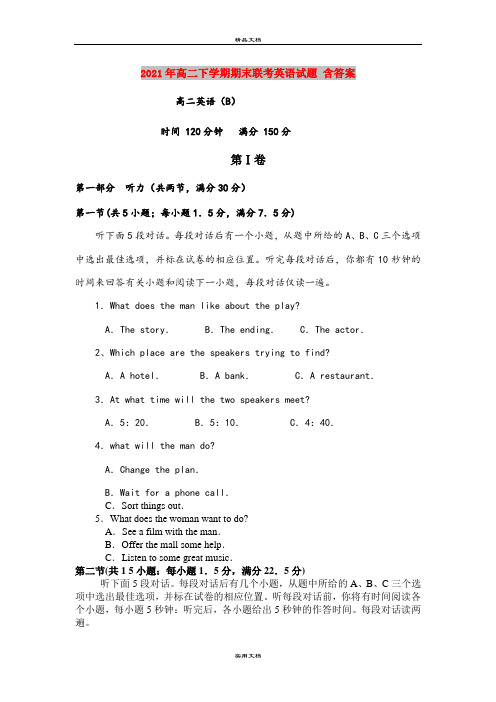
2021年高二下学期期末联考英语试题含答案高二英语(B)时间 120分钟满分 150分第Ⅰ卷第一部分听力(共两节,满分30分)第一节(共5小题;每小题1.5分,满分7.5分)听下面5段对话。
每段对话后有一个小题,从题中所给的A、B、C三个选项中选出最佳选项,并标在试卷的相应位置。
听完每段对话后,你都有10秒钟的时间来回答有关小题和阅读下一小题,每段对话仅读一遍。
1.What does the man like about the play?A.The story. B.The ending. C.The actor.2、Which place are the speakers trying to find?A.A hotel. B.A bank. C.A restaurant.3.At what time will the two speakers meet?A.5:20. B.5:10. C.4:40.4.what will the man do?A.Change the plan.B.Wait for a phone call.C.Sort things out.5.What does the woman want to do?A.See a film with the man.B.Offer the mall some help.C.Listen to some great music.第二节(共1 5小题:每小题1.5分,满分22.5分)听下面5段对话。
每段对话后有几个小题,从题中所给的A、B、C三个选项中选出最佳选项,并标在试卷的相应位置。
听每段对话前,你将有时间阅读各个小题,每小题5秒钟:听完后,各小题给出5秒钟的作答时间。
每段对话读两遍。
听第6段材料,回答第6、7题。
6.Where is Ben?A.In the kitchen.B.At school.C.In the park.7.What will the children do in the afternoon?A.Help set the table.B.Have a party.C.Do their homework.听第7段材料,回答第8、9题。
2021年河南省郑州市新郑实验中学高二英语下学期期末试题含解析
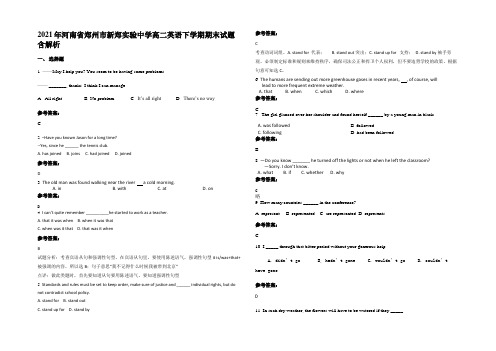
2021年河南省郑州市新郑实验中学高二英语下学期期末试题含解析一、选择题1. ——May I help you? You seem to be having some problems.—— _______, thanks. I think I can manage.A. All rightB. No problemC. It’s all rightD. There’s no way参考答案:C2. –Have you known Jason for a long time?--Yes, since he ______ the tennis club.A. has joinedB. joinsC. had joinedD. joined参考答案:D3. The old man was found walking near the river a cold morning.A. inB. withC. atD. on参考答案:D4. I can’t quite remember __________he started to work as a teacher.A. that it was whenB. when it was thatC. when was it thatD. that was it when参考答案:B试题分析:考查宾语从句和强调性句型,在宾语从句里,要使用陈述语气,强调性句型it is/was+that+被强调的内容,所以选B;句子意思“我不记得什么时候我被带到北京”点评:做此类题时,首先要知道从句要用陈述语气,要知道强调性句型5. Standards and rules must be set to keep order, make sure of justice and ______ individual rights, but do not contradict school policy.A. stand forB. stand outC. stand up forD. stand by 参考答案:C考查动词词组。
陕西省西安市第一中学2021-2022学年高二下学期期末考试英语试题 Word版含答案
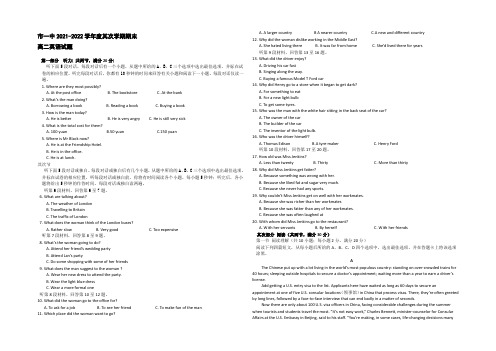
市一中2021-2022学年度其次学期期末高二英语试题第一部分听力( 共两节,满分20分)听下面5段对话。
每段对话后有一个小题,从题中所给的A、B、C三个选项中选出最佳选项,并标在试卷的相应位置。
听完每段对话后,你都有10秒钟的时间来回答有关小题和阅读下一小题。
每段对话仅读一遍。
1. Where are they most possibly?A. At the post officeB. The bookstoreC. At the bank2. What’s the man doing?A. Borrowing a bookB. Reading a bookC. Buying a book3. How is the man today?A. He is betterB. He is very angryC. He is still very sick4. What is the total cost for them?A. 100 yuanB.50 yuanC.150 yuan5. Where is Mr Black now?A. He is at the Friendship Hotel.B. He is in the office.C. He is at lunch.其次节听下面5段对话或独白。
每段对话或独白后有几个小题,从题中所给的A、B、C三个选项中选出最佳选项,并标在试卷的相应位置。
听每段对话或独白前,你将有时间阅读各个小题,每小题5秒钟;听完后,各小题将给出5秒钟的作答时间。
每段对话或独白读两遍。
听第6段材料,回答第6至7题。
6. What are talking about?A. The weather of LondonB. Travelling to BritainC. The traffic of London7. What does the woman think of the London buses?A. Rather slowB. Very goodC. Too expensive听第7段材料,回答第8至9题。
- 1、下载文档前请自行甄别文档内容的完整性,平台不提供额外的编辑、内容补充、找答案等附加服务。
- 2、"仅部分预览"的文档,不可在线预览部分如存在完整性等问题,可反馈申请退款(可完整预览的文档不适用该条件!)。
- 3、如文档侵犯您的权益,请联系客服反馈,我们会尽快为您处理(人工客服工作时间:9:00-18:30)。
2021年高二下学期期末综合练习英语含答案第一部分听力(共两节,满分30分)第一节(共5小题;每小题1.5分,满分7.5分)听下面5段对话。
每段对话后有一个小题,从题中所给的A、B、C三个选项中选出最佳选项,并标在试卷的相应位置。
听完每段对话后,你都有10秒钟的时间来回答有关小题和阅读下一小题。
每段对话仅读一遍。
听下面5段对话,回答第1~5小题。
1.Who is Mr. White?A.A salesman.B.A professor.C.A repairman.2.Where does the woman work?A. At a restaurant.B. At a hotel.C. At a department store.3.What time does the man think they will leave?A. At 7:15.B. At 7:25.C. At 7:35.4.What does the man mean?A. He didn’t like the work so much because it kept him working long hours.B. He didn’t like the work because it wasn’t interesting.C. He liked the work very much.5.What was the mark the woman got in her exam?A.90.B.95.C.98.第二节(共15小题;每小题1.5分,满分22.5分)听下面5段对话或独白。
每段对话或独白后有几个小题,从题中所给的A、B、C三个选项中选出最佳选项,并标在试卷的相应位置。
听每段对话或独白前,你将有时间阅读各个小题,每小题5秒钟;听完后,各小题给出5秒钟的作答时间。
每段对话或独白读两遍。
听第6段材料,回答第6~8小题。
6.What caused Mr. Miller to be late this morning?A. Watching a play on TV last night.B. Watching a basketball match on TV last night.C. Watching a football match on TV last night.7.How did Mr. Miller go to work?A. By cab.B. By train.C. By bus.8.What happened to Mr. Miller after his explanation?A. He was fired as soon as possible.B. He was fired at once.C. He was warned of following the rules for work.听第7段材料,回答第9~11小题。
9.When did the conversation take place?A. Before the maths exam.B. Before the science exam.C. After the science exam.10.What is the most probable relationship between the man and woman?A. They are friends.B. They are classmates.C. They are teacher and student.11.Why is the science exam difficult?A. The teacher is too young and less experienced.B. The teacher likes to give hard exams.C. We don’t know.听第8段材料,回答第12~14小题。
12.What’s the reason for the woman to buy the nylon one instead of the yellow one?A. The nylon one is cheap and it is nice, too.B. The yellow one is too expensive.C. Both A and B.13.How much does the woman pay at last?A.28.88 dollars.B.15.88 dollars.C.13 dollars.14.How many things does the woman buy in all?A. Two.B. One.C. Some.听第9段材料,回答第15~17小题。
15.How often does the woman watch a football match?A. Nearly once a week.B. Nearly once a month.C. Nearly every Sunday.16.Why does the man say he loves cricket very much?A. He used to be a good player though he never plays it now.B. He used to be a good player and he has fallen into a habit of playing it from that time.C. He used to play it well and now he often watches cricket matches instead.17.Which one of the following is true according to the conversation?A. Neither the man nor the woman watches any cricket match.B. Either the man or the woman watches soccer matches.C. Not only the man but also the woman watches cricket matches.听第10段材料,回答第18~20小题。
18.What was done to find people’s ideas about the women’s movement?A.A question was asked of husbands.B.A group was set up to interview people.C.A survey was made to both men and women.19.Who help most at home?A. Danish husbands.B. British husbands.C. Italian husbands.20.What can we learn from what the speaker said?A. Housework should be shared between men and women.B. More than 50% of Danish men help in the house.C. Danish men are more afraid of their wives.第二部分:英语知识运用(共两节, 满分45分)第一节:语法和词汇知识(共15小题,每小题1分,满分15分)21. –Do you know Anna’s telephone number?–____. As a matter of fact, I don’t know any Anna, either.A. I think soB. I’m afraid notC. I hope soD. I’d rather not22. On the sea near Diaoyu Island, ________ Chinese fishing boat was stopped by the Japanese and ________ sailors were arrested illegally.A. a; theB. the; theC. a; 不填D. the; 不填23. _____ of danger in the street at night, she had to go home with a friend _____ her.A. Being warned; acpaniedB. Having warned; acpanyingC. Warning; acpanying C. Having been warned; acpanying24. Frank put the medicine in a top drawer to make sure it would not be __________ to the children.A. accessibleB. acceptableC. incredibleD. suitable25. The girl is an excellent student but not once in these years________ caught being late.A. has she gotB. she has beenC. was sheD. she got26. John went to the hospital alone. If he me about it, I would have gone with him.A. should tellB. tellsC. toldD. had told27. Stand over there ___ you’ll be able to see the oil painting better.A. butB. tillC. andD. or28. A few years ago, My Heart Will Go On was a popular song among young people, ______ were often heard singing it at parties.A. whoB. whichC. theyD. that29. Lacking rain, many river in Yunnan province have ______ recently.A. dried upB. dried outC. dried offD. dried at30.They _____ on the program for almost one week before I joined them, and now, we ____on it as no good results have e out so far.A. had been working; are still workingB. had worked; were still workingC. have been working; have worked C. have worked; are still working31. Nobody but doctors or nurses and those____ by Dr.Hu ____ to enter the patient’s room.A. invited; is allowedB. are invited; are allowedC. being invited; allowedD. invited; are allowed32. The red light above the elevator______ that he was at the tenth floor then.A. suggestedB. symbolizedC. observedD. indicated33. She is _______ you could ever meet.A. as a gentle girl asB. as gently a girl asC. a girl as gentleD. as gentle a girl as34. Having taken our seats, ______.A. the professor began the lectureB. the lecture began in no timeC. we were attracted by the lecture immediatelyD. the bell announced the beginning of the lecture35. You are saying that everyone is equal, ______ is ______ I disagree.A. which; whereB. which; whatC. that; whereD. that; what第二节完形填空(共20小题;每小题1.5分,满分30分)阅读下面短文,从短文后各题所给的四个选项(A、B、C和D)中,选出可以填入空白处的最佳选项,并在答题卡上将该项涂黑。
